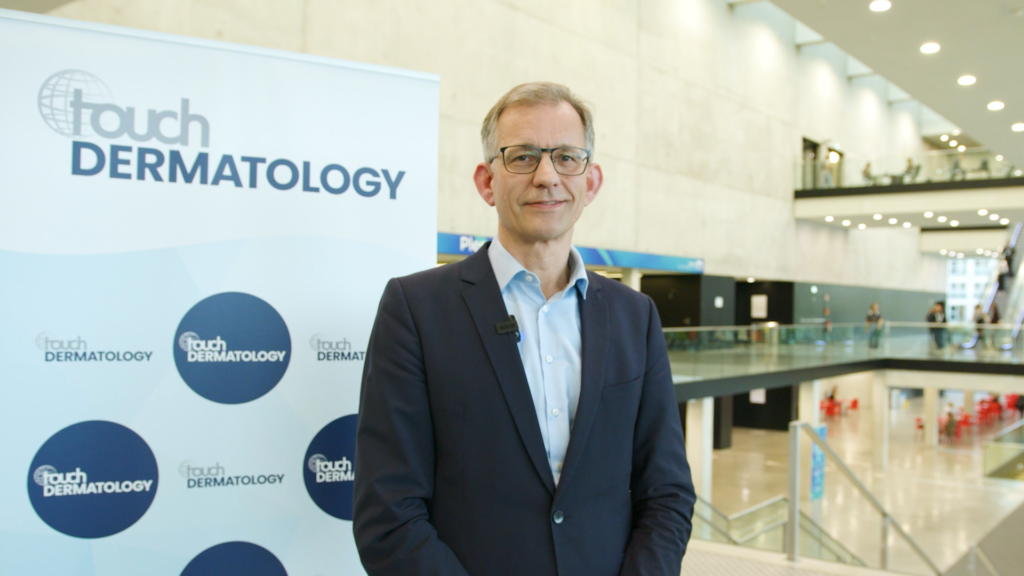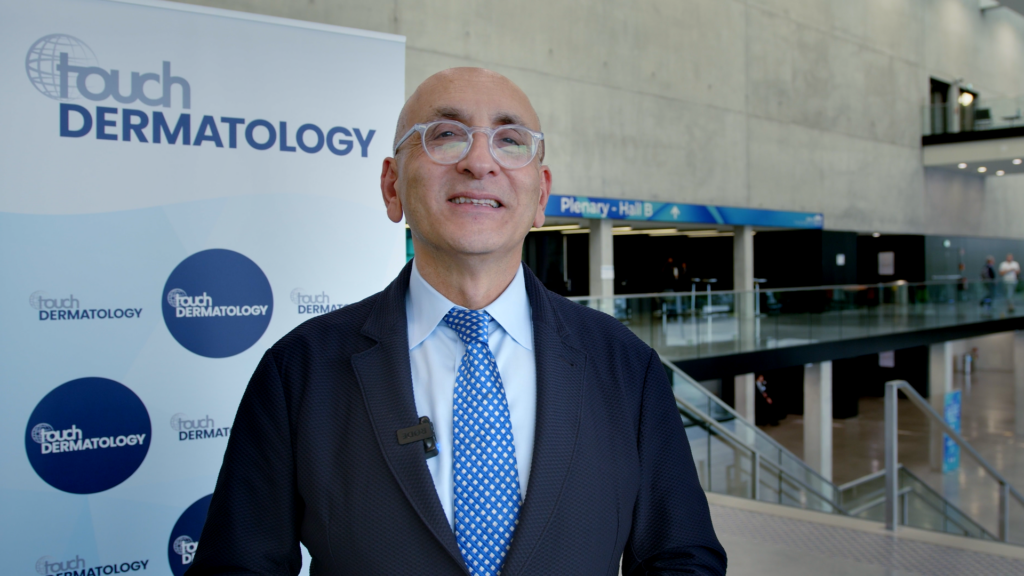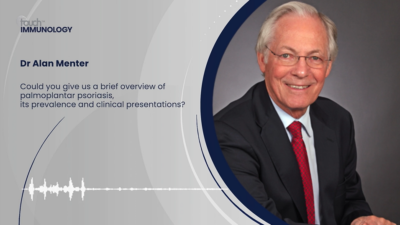TouchDERMATOLOGY coverage from EADV 2024:
Recent developments regarding ESK-001, an oral, highly selective TYK2 inhibitor being developed for moderate-to-severe plaque psoriasis, were presented at EADV 2024. TYK2 plays a crucial role in the cell signalling through cytokines such as IL-23 and IL-12, both of which are key players in the pathogenesis of psoriasis. ESK-001 aims to inhibit these pathways to offer an effective treatment option for patients. The STRIDE (NCT05600036) study, a phase 2 randomized, placebo-controlled trial, has already shown promising, dose-dependent efficacy, and the ongoing open-label extension study is assessing its long-term safety and effectiveness.
We spoke with the study’s lead investigator, Dr. Andrew Blauvelt, to explore the 28-week results from the open-label extension of the STRIDE trial (NCT05739435) and to discuss how ESK-001 could potentially compare with other TYK2 inhibitors currently approved, and those in development, for psoriasis.
Associated Abstract: Blauvelt A, et al. Efficacy and safety of ESK-001, a highly selective oral TYK2 inhibitor, in moderate-to-severe plaque psoriasis: Phase 2 results through week 28. Abstract number, 8009. EADV 2024
Questions:
- What is ESK-001, and what is the rationale for using it to treat plaque psoriasis?
- What are the aims and design of the STRIDE study, and which data were presented at EADV 2024?
- What did the 28-week results teach us about the efficacy of ESK-001?
- What was observed in terms of safety across the treatment arms?
- How could ESK-001 fit into the current treatment paradigm for plaque psoriasis?
Disclosures: Andrew Blauvelt discloses consultancy fees, and grant/research support from Alumis.
This content has been developed independently by Touch Medical Media for touchDERMATOLOGY. It is not affiliated with the European Academy of Dermatology and Venereology (EADV). Unapproved products or unapproved uses of approved products may be discussed by the faculty; these situations may reflect the approval status in one or more jurisdictions. No endorsement of unapproved products or unapproved uses is either made or implied by mention of these products or uses by Touch Medical Media or any sponsor. Views expressed are the speaker’s own and do not necessarily reflect the views of Touch Medical Media.
Transcript:
Transcript:
Q: What is ESK-001, and what is the rationale for using it to treat plaque psoriasis?
So ESK-001 is a novel TYK2 inhibitor. TYK2 stands for tyrosine kinase two. TYK2 is one of the members of the JAK family. So there’s JAK1, JAK2, JAK3, and TYK2. And TYK2, because of that role, it’s involved in cell signaling. So when a cytokine binds to a cytokine receptor on the surface of a cell, there’s a series of signals that happens within the cell. And, JAKs, including TYK2, carry signals through to the nucleus.
In particular, TYK2 is involved in signalling of cytokines that are important in psoriasis pathogenesis, namely IL-23. So IL-23 utilizes TYK2 to signal. Also, IL-12 does and type one interferons. And type one interferons have been implicated in creation of new psoriasis lesions or early onset psoriasis. And, of course, we know IL-23 is involved in psoriasis. So by inhibiting TYK2, we’re going to be blocking those cytokines. And, we also know that there’s already a TYK2 inhibitor on the market, deucravacitinib.
So this is, if you will, a next generation or second generation.
The makers of of ESK-001 are Alumis [Inc] and they have actually designed this drug to optimize its TYK2 inhibitory effect, in terms of in vitro assays and characterization and, looking at TYK2 inhibition in humans who are taking the drug and making sure they’re maximally, inhibiting this target.
Q: What are the aims and design of the STRIDE study, and which data were presented at EADV 2024?
So ESK-001 has been studied in a phase 2 study called STRIDE. The primary endpoint results of STRIDE have been previously reported at the AAD meeting, in March of this year. And so that was a 12 week primary endpoint with different doses of ESK-001 and versus placebo in patients with moderate-to-severe plaque psoriasis.
What I presented at the meeting in Amsterdam at the EADV meeting is the open-label extension, or the long-term efficacy results of people who continued, so started in STRIDE and then continued on drug over the course of 28 weeks. So that was the new result, is the sort of ongoing, open label, with ESK-001 one over the course of 28 weeks.
Now, patients were randomized, to one of two doses. So they either received 40 mg once daily or forty milligrams twice daily in the open label extension. And, that was the overall design and purpose in what I presented at EADV.
Q: What did the 28-week results teach us about the efficacy of ESK-001?
Yeah. So very interestingly, we do know just a little bit more background on deucravacitinib.
We know that that drug, the more you take it, the more you’re on it. There is a continual increase in efficacy, for example, from the week 16 primary endpoint to week 24. So with the previous drug, the other TYK2 inhibitor, we did see this continual increase in efficacy, and that’s actually what we saw with ESK-001 as well. So we saw, after 12 weeks with the highest dose, we had about 15 % passing PASI 100 and about 64 %, PASI 75. That’s at the week 12, and that was what was previously reported.
So just remember those numbers. So we when we continued, on patients at the high dose, that 15 % PASI 100 went up to 35 % PASI 100 over time. Over the course of, 28 weeks, we saw a lot more patients go to complete clearance. And then the PASI 75 number, which a lot of people like to know, was around 85 %, over the course of the 28 weeks.
So we had significant increases from the week 12 time point out to another 28 weeks, if you will, kind of like a week 40 time point, especially with the twice daily dosing. So the single dose, 40 mg once a day showed less efficacy, so we did see a dose-response. And so, basically, the bottom line with this result is that the company has decided to go forward, in a phase 3 program with 40 mg twice daily. And they think they have the possibility of having the best in class for a TYK2 inhibitor.
Q: What was observed in terms of safety across the treatment arms?
Very little. Not much at all of anything. So including, we didn’t really see any increases in AEs from the 40 mg once a day to the 40 mg twice a day. So that’s very encouraging, because, again, we had the experience with deucravacitinib. If we push the dose a little bit higher than the currently available dose, we did start seeing some side effects. So this did not occur with ESK-001. So, really no lab abnormalities, no significant adverse events of interest.
So very promising in terms of safety as well.
Q: How could ESK-001 fit into the current treatment paradigm for plaque psoriasis?
There’s actually a third TYK2 inhibitor in development, with Takeda. So there’s, one on the market, deucravacitinib, and then there’s two in development, one with Alumis, one with Takeda. I think both of the second and third companies are trying to beat what’s on the market. So they’ve made their, if you will, next generation TYK2 inhibitors, to try to get even a better oral drug. So I didn’t even really emphasize that these are oral drugs.
And so, I think it’s good for our specialty, good for patients. We have continual improvement in terms of the efficacy seen with oral drugs. And we know that they’re popular among patients and dermatologists. So I think having better and better oral drugs is a good thing for the field.
Interviewer/Editor: Gina Furnival
Cite: Blauvelt A. Novel, oral TYK2 inhibitor, ESK-001, reports improved efficacy with prolonged use in plaque psoriasis. touchDERMATOLOGY. October 3, 2024.










